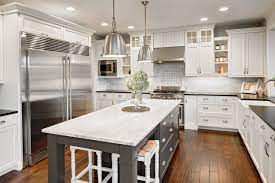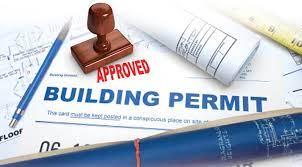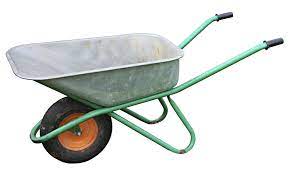
Remodeling your kitchen can be a daunting and expensive endeavor. However, with careful planning and consideration, you can create the kitchen of your dreams without breaking the bank.
In this blog post, we’ll go over some important factors to consider before beginning a kitchen remodel.
We’ll explore topics such as budgeting, floor plans, storage solutions, and design ideas. After reading this post, you’ll have a better idea of how to make the most of your kitchen renovation project.
Budgeting for Your Kitchen Remodel
Remodeling your kitchen can be an exciting project, but it's important to plan your budget carefully to avoid overspending. Before diving into the remodeling process, take some time to assess your financial situation and set a realistic budget.
Start by determining how much you're willing to spend on your kitchen remodel. Consider factors such as your income, savings, and any additional funds you can allocate to the project. It's crucial to have a clear understanding of your budget to avoid financial stress or unexpected expenses along the way.
Next, make a list of all the elements you want to include in your new kitchen. This could range from new cabinets and countertops to appliances and lighting fixtures. Research the average costs of these items to get an idea of how much you need to allocate for each category.
Remember to factor in additional costs such as labor fees, permits, and any unforeseen expenses that may arise during the remodel. It's always a good idea to leave some room in your budget for unexpected costs to avoid going overboard.
Consider consulting with a professional kitchen remodeler or contractor to get an accurate estimate of the project's overall cost. They can provide guidance and help you determine if your budget aligns with your goals.
By setting a realistic budget for your kitchen remodel, you'll be able to prioritize your needs and make informed decisions throughout the process. It's important to strike a balance between your desired outcomes and what you can afford. Planning ahead will help ensure a smooth remodeling experience and a kitchen that meets your expectations without breaking the bank.
Assessing Your Needs and Goals
Before diving into a kitchen remodel, it’s essential to assess your needs and goals for the project. Start by considering how you use your kitchen on a daily basis. Do you do a lot of cooking and need ample counter space? Or perhaps you enjoy entertaining and need a larger dining area. Take the time to really think about how your current kitchen functions and what improvements you would like to make.
Another important aspect to consider is your future plans. Are you planning on staying in your current home for the long term? If so, it may make sense to invest in high-end appliances and materials that will stand the test of time. On the other hand, if you anticipate moving in the next few years, it may be more beneficial to focus on cost-effective updates that will appeal to potential buyers.
It’s also worth considering your overall aesthetic goals. Do you want a modern, sleek kitchen or a cozy, traditional space? Think about the style and vibe you want to achieve, as this will help guide your design decisions.
Once you have a clear understanding of your needs and goals, it’s important to communicate them effectively with your contractor or design team. By doing so, they can help ensure that the final result aligns with your vision and meets your expectations. Assessing your needs and goals is a critical step in the kitchen remodeling process, as it sets the foundation for the rest of the project.
Choosing the Right Design and Layout
The design and layout of your kitchen are crucial factors to consider when remodeling. You want to make sure that the space is both functional and visually appealing. Begin by thinking about how you currently use your kitchen and what improvements you want to make.
Do you need more counter space or storage? Would an island or a breakfast bar make your kitchen more useful for entertaining? Next, consider your personal style and preferences.
Do you want a traditional or modern look? Do you prefer bold or neutral colors? Once you have a general idea of what you want, work with a designer or contractor to create a detailed plan and layout.
They can help you select materials and fixtures that fit your budget and style while ensuring that your kitchen is efficient and functional. Take time to review the plans carefully and make any necessary adjustments before moving forward. By choosing the right design and layout, you can create a kitchen that you will enjoy for years to come.
Selecting Materials and Appliances
Once you've determined your budget, needs, and layout, it's time to start thinking about the materials and appliances for your kitchen remodel. This can be one of the most exciting and overwhelming aspects of the process, but it's important to choose wisely to ensure that your kitchen looks and functions well for years to come.
First, consider the style and aesthetic you want for your kitchen. Do you want a sleek and modern look or a more traditional, cozy feel? This will guide your selection of materials, such as countertops, flooring, and cabinetry. Some popular options include granite or quartz countertops, hardwood or tile flooring, and custom cabinets in a variety of finishes.
Next, think about the appliances you need and want for your kitchen. Do you need a new refrigerator, stove, or dishwasher? Do you want to upgrade to a smart appliance or install a range hood for ventilation? Consider your cooking habits and lifestyle to choose appliances that will fit your needs and add value to your kitchen.
Finally, remember to factor in the cost and durability of the materials and appliances you choose. You want to invest in products that will last and add value to your home, rather than opting for cheaper, lower-quality options that will need to be replaced in a few years. Consult with your contractor or designer for recommendations on the best materials and appliances for your budget and goals.
Hiring a Contractor or DIY?
One of the biggest decisions you’ll have to make when planning your kitchen remodel is whether to hire a contractor or take on the project yourself. DIY projects can be cost-effective, but they also require a lot of time and expertise. On the other hand, hiring a contractor can take the pressure off and ensure that your remodel is done correctly and efficiently.
If you do choose to hire a contractor, it’s important to do your research and find someone who is experienced, licensed, and insured. Look for reviews and references, and make sure to get a written contract that outlines the scope of work, timeline, and budget. Communication is also key when working with a contractor, so make sure you have open lines of communication and that any concerns or changes are addressed promptly.
If you decide to go the DIY route, make sure you have a realistic understanding of your abilities and the time required for the project. Take advantage of online resources and tutorials, and consider working with a designer or consultant to ensure that your vision is executed properly. Keep in mind that DIY projects can be more prone to errors and delays, so be patient and have a backup plan in case of any setbacks.
Planning for Disruptions and Temporary Setups
One of the biggest challenges of kitchen remodeling is the disruption it causes to your daily routine. While the end result will be worth it, you should plan ahead to minimize the disruption as much as possible.
During the remodeling process, you may have to set up temporary cooking and dining areas, which can be inconvenient but necessary. Make sure you have access to a functioning sink and countertop for preparing food, and consider using disposable plates and utensils to reduce dishwashing.
Also, keep in mind that construction work can generate a lot of dust and debris, which can affect your home's air quality. Consider sealing off the work area with plastic sheeting and use fans and air filters to circulate clean air. If you have pets or children, you may need to keep them out of the construction zone for safety reasons.
Finally, communicate regularly with your contractor to ensure that you are both on the same page regarding timelines, deadlines, and any unexpected issues that may arise. By planning ahead and staying flexible, you can minimize the disruptions of a kitchen remodel and ensure that your project stays on track.
Considering Long-Term Maintenance and Durability
When remodeling your kitchen, it's important to think about the long-term maintenance and durability of the materials and appliances you choose. While you may be tempted to opt for trendy and fashionable options, it's essential to consider how well they will hold up over time.
Start by assessing the wear and tear your kitchen typically experiences. Are you someone who cooks frequently and uses the kitchen heavily? If so, you'll want to invest in durable materials that can withstand the daily use and potential spills. Look for materials like granite or quartz countertops that are resistant to scratches and stains.
Additionally, consider the maintenance requirements of the materials and appliances you choose. Some materials, like stainless steel appliances, require regular cleaning to maintain their shine and prevent smudges. On the other hand, materials like laminate countertops are relatively low maintenance and easy to clean.
Another factor to consider is the longevity of your design choices. Will the style you choose still be fashionable in a few years? While it's impossible to predict future design trends, it's best to choose a timeless design that will continue to look great even as styles change.
Lastly, consider the warranty and guarantee offered by the manufacturers of the materials and appliances you choose. This can give you peace of mind knowing that if any issues arise, you're covered.
By considering the long-term maintenance and durability of your remodeling choices, you can ensure that your kitchen will continue to look and function well for years to come.
Finalizing Your Plans and Timeline
Once you have completed all the necessary steps in the remodeling process, it's time to finalize your plans and create a timeline for your kitchen remodel. This is an important step to ensure that the project runs smoothly and is completed within the desired timeframe.
Start by reviewing your plans and making any necessary adjustments. Consider factors such as the availability of materials and appliances, the time it will take to complete each phase of the remodel, and any potential issues that may arise. It's also important to communicate with your contractor, if you have one, to ensure that everyone is on the same page and that there are no misunderstandings.
Next, create a detailed timeline for your remodel. This should include specific start and end dates for each phase of the project, as well as any additional tasks that need to be completed, such as painting or installing flooring. Be realistic in your timeline and allow for potential delays or unexpected issues that may arise during the remodel.
Finally, consider any additional preparations that need to be made before the remodel begins. This may include packing up your kitchen and setting up a temporary kitchen space, if necessary. It's also important to communicate with your family or household members about the upcoming changes and make any necessary arrangements to minimize disruptions during the remodel.
By finalizing your plans and creating a detailed timeline, you can ensure that your kitchen remodel stays on track and is completed to your satisfaction. Take the time to review all the details and make any necessary adjustments before the work begins. With careful planning and organization, your kitchen remodel can be a smooth and successful process.






















